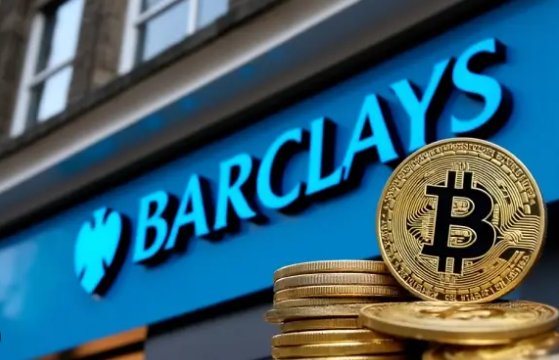Barclays Bank has reached the headlines again, this time not for a new financial product, but for a decision that has left many in the cryptographic community by questioning their motives. As of June 27, 2025, Barclays will officially block all transactions related to cryptography performed with their credit cards. The announcement, which appeared on the Bank’s official support page, has caused criticism for what many call a “double standard.”
A few days before the restriction was made public, the bank invested in silence $ 131 million in the Blackrock Bitcoin ETF, as revealed through its 13F presentation before the United States Stock Exchange and Securities Commission (SEC). For many observers, this paints a clear image: Barclays is closing the door for retail customers while maintaining an open side entrance for itself.
This contradiction has generated concerns throughout the cryptographic space. If the asset is considered too risky for consumers to buy directly with a credit card, why is the institution itself investing millions through exposure to ETF?
 |
| Source: x |
Consumer protection or centralized control?
Barclays states that the ban is “to protect consumers” from possible financial risk. According to the bank, using money to buy volatile assets such as cryptocurrencies could generate financial problems for many customers.
While that reasoning may seem logical, it has left many unvolved. Critics argue that the bank is not trying to protect customers, but rather, trying to maintain control over who benefits from the next cryptographic wave.
 |
| Source: x |
In truth, Barclays is not against Crypto. It is only to choose to participate in it through regulated channels of institutional degree. In other words, the bank wants exposure to Bitcoin, but only in its own terms.
The institutions accumulate, retail trade is being marginalized
Barclays is not the only institution that makes this movement. Throughout the United Kingdom and Europe, banks are adjusting restrictions on retail access to cryptography. Meanwhile, investment giants are loading in digital assets through ETF and other financial instruments.
This growing division between institutional and retail access has become a recurring theme in the cryptographic world. The message is clear: institutions can accumulate in silence, while the public is out of action.
A Coin Bureau tweet captured mood perfectly:
“Blocked retailer. Stack institutions”.
Why could this be optimistic for Bitcoin
While this may seem negative development, some analysts believe that it could actually be optimistic in the long term. Institutional accumulation tends to precede bull races. With banks and coverage funds that pour capital into Bitcoin through ETF and trusted funds, a solid base is being built, although far from the public eye.

This type of “silent accumulation” often prepares the scenario for significant price movements later. From now on, Bitcoin is quoted to around $ 107,324.93, an increase of almost 2% in the last 24 hours, according to Coinmarketcap. If this trend continues, it could only be a matter of time before a large break occurs, driven by institutional capital.
The most important question: Who controls the future of cryptography?
The situation with Barclays reflects a major problem in the financial world: the guard of emerging financial tools. While Crypto originally imagined as a way to democratize finances, institutional players are increasingly configuring the rules of the game.
Retail investors are told to “wait for their turn”, while the traditional finance elite takes their positions in what could be the next digital gold fever.
So, the question remains: is it really about protecting users, or simply controlling access?
Conclusion: access to encryption is changing, but not for everyone
Barclays’s decision may not try to prohibit cryptography completely. Rather, it’s about controlling how already through who People can access him. As the bank invests a lot in the Bitcoin ETFs, it is also closing retail access through traditional means.
 |
| Source: x |
For everyday users, this serves as an attention call. The future of Bitcoin and other digital assets may not be in the hands of the masses, but rather in the hands of the few who have early institutional access.
While cryptogram is still promising as a decentralized tool for financial freedom, access to it is being redefined by those with greater influence. And if the case of Barclays is an indicator, the following phase of cryptographic adoption may not seem the last.
It is not about whether the crypt will become the main current, it is a matter of Who comes to lead the way.
Writer
@Ellena
Ellena is an experienced cryptographic writer who loves to explore the intersection of blockchain technology and financial markets. She regularly provides information about the latest trends and innovations in the currency space.
See other news and articles on Google News
Discharge of responsibility:
The articles published in Hokanews are intended to provide updated information on various topics, including cryptocurrency and technology news. The content on our site is not intended to be an invitation to buy, sell or invest in any asset. We encourage readers to conduct their own research and evaluation before making an investment or financial decision.
Hokanews is not responsible for any loss or damage that may arise from the use of the information provided on this site. Investment decisions must be based on an exhaustive investigation and advice of qualified financial advisors. Information about Hokanews can change without prior notice, and we do not guarantee the precision or integrity of the published content.


